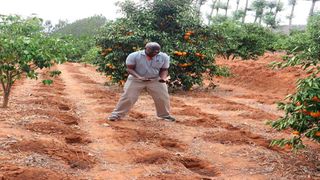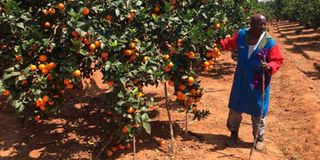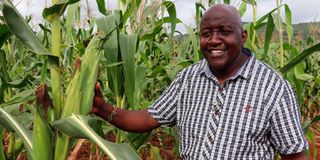
Justus Kimeu on his pixie orange farm in Kithiiani village in Makueni County. He grows the fruit trees in planting basins.
Seeds of Gold
Premium
From a dry farm to oasis of plenty
In the last eight months, residents of Mumbuni location in Makueni County have received rainfall twice.
The area is thus dry, most of the soils are caked and there is hardly any crop on the farms.
However, in Kithiiani village, a farmer has mastered the art of working with the little rains by conserving moisture in the soil to grow fruits.
His six-acre farm that is surrounded by grevillea trees hosts 750 pixie orange trees. The fruits are highly sought after in the market because they are sweeter and juicier than ordinary oranges. “I use a technique that ensures the soils remain moist and healthier throughout the year,” says Justus Kimeu, who is also the chairman of Makueni Conservation Farmers, a community based organisation.
He has made tens of manure filled planting basins on the farm, which absorb the little water available and keep the soils moist despite the tough climatic conditions.
The basins, according to Kimeu, are dug at least a month before the rains start. They measure 30cm deep and 15cm wide. Once the soil is scooped, the basin is filled with two handfuls of ordinary compost manure, which is then covered with top soil so that it is not directly exposed to the sun.

Justus Kimeu on his pixie orange farm in Kithiiani village in Makueni County.
“From one basin to another, there is a spacing of 75cm, while one line of basin to another there is 90cm space. This spacing keeps the manure well-distributed on the farm to trap sufficient moisture,” Kimeu tells Seeds of Gold.
In the basins besides the fruit seedlings, he also plants nitrogen-fixing cover crops such as bush beans or cowpeas, but many times they remain without a crop – only hosting manure.
“This technique is known as regenerative agriculture which helps to better the soil structure as it keeps it moist all-round the year.”
The technique is taking root among smallholder farmers in dryland areas.
“We are encouraging farmers to use it as a way of adapting to the ever-changing climatic conditions,” says Assan Ng'ombe, the resilience officer for the Alliance for a Green Revolution in Africa.
Thanks to the technique, Kimeu is one of the most-thriving pixie orange farmers not only in the region. Besides pixies, his farm also hosts 700 trees of ordinary grafted oranges, which are drought-tolerant.
Pixie oranges fetch up to Sh100 per kilogramme at farm gate, which is about seven fruits. Within Nairobi groceries, each fruit retails at an average of Sh30.
“A single well-tendered pixie orange tree with the right soil conditions matures in 18 months and can produce up to 300 kilos in a season, which translates to up to Sh30,000,” he says.

Justus Kimeu on his farm in Makueni County.
Regenerative agriculture, according to George Mabuka, the manager in-charge of the climate-smart agriculture programme at Cereal Growers Association, is a new approach to agriculture which emphasizes the use of a combination of simple soil and water conservation practices some of which had been forgotten such as crop rotation, mulching, the use of terraces and planting holes which are now improved to enhance their effectiveness.
Dr Patrick Gicheru, a soil scientist and the Centre Director for the Kenya Agricultural and livestock Research Organisation (Kalro) in Embu County, says use of manure is the best way to restore physical soil structure and replenish nutrients.





